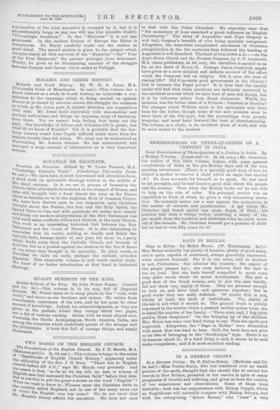TWO BOOKS ON THE ENGLISH CHURCH. The Foundations of the
English Church, By J. H. Maude, M.A. (Methuen and Co. 2s. Bd. net.)—This volume belongs to the series of " Handbooks of English Church History," appearing under the editorship of the Rev. J. H. Burn. "There was no English ,4'.11-aroll before 507 A.D.," says Mr. Maude very precisely. And nig reason is that, "as far as we can tell, no man or woman of English race bad embraced the Christian faith" before that date. i But is not this to put too groat a stress on the word " English " P the we want to know is : Whence came the Christian faith in h ° °°aacountrycalled England, not in one of the many races out of
which the English race has come P We do not know that Mr. Maude's theory affects his narrative. He does not omit
to deal with the Collie Churches. He expressly says that " the monastery of Iona exorcised a great influence on English Christianity." The story of Augustine and Pope Gregory is well told, Gregory's breadth of view being specially recognised. Altogether, the somewhat complicated movement of Christian evangelisation in the two centuries that followed the landing of Augustine is well described. The limit of time is 800 A.D.—In The Anglo-Saxon Church and the Norman Conquest, by C. T. Cruttwoll, M.A. (same publishers, 2s. Bd. net), the narrative is carried on as far as the death of Henry H. Perhaps Canon Cruttwell might have given us a more detailed and definite account of the effect which the Conquest had on religion. Did it raise the tone of clerical life P Did it promote good government in the Church ? Did it increase the Papal power ? It is true that the careful reader will find that these questions are indirectly answered in the excellent account which we have here of men and things, but it is by inference rather than direct statement. Which, for instance, was the better ideal of a Primate: Dunstan or Amelia? Tho changes which William made in the episcopate may have been for the better, though some of the now prelates seem to have boon of the Ode typo ; but the proceedings wore grossly irregular, and must have lowered the tone of churchmauship. Tho volume, as a whole, is an excellent piece of work, and will be most useful to the student.


























































 Previous page
Previous page